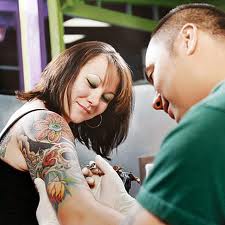 This month’s Clinical Infectious Diseases evaluated the transmission of HCV through tattooing and piercing. It is important to note that HBV is also of great concern when considering a tattoo or piercing. Unless you are vaccinated against hepatitis B, you are at risk for HBV if you are tattooed or pierced under unsterile conditions. The net-net is if you have a tattoo or piercing in a professional parlor – one that follows infection control practices and uses single-use items whenever possible and sterilizes re-used equipment using ultrasonic cleaning and sterilization with an autoclave , there does not appear to be an increased risk, though additional study is warranted. However, tattoos or piercings in prisons, or other settings that are not performed under sterile conditions are a serious danger.
This month’s Clinical Infectious Diseases evaluated the transmission of HCV through tattooing and piercing. It is important to note that HBV is also of great concern when considering a tattoo or piercing. Unless you are vaccinated against hepatitis B, you are at risk for HBV if you are tattooed or pierced under unsterile conditions. The net-net is if you have a tattoo or piercing in a professional parlor – one that follows infection control practices and uses single-use items whenever possible and sterilizes re-used equipment using ultrasonic cleaning and sterilization with an autoclave , there does not appear to be an increased risk, though additional study is warranted. However, tattoos or piercings in prisons, or other settings that are not performed under sterile conditions are a serious danger.
The process of tattooing entails repeated injections of tiny drops of ink. That’s thousands of tiny needle sticks per minute, and a very effective transmission route for blood borne pathogens like HBV, HCV and HIV. This does not mean getting a tattoo will expose you to infectious disease, but if you choose a tattoo parlor that is not well regulated and safely follows all infection control practices, then you greatly increase your risk of infection.
Here’s the problem with tattoo parlors in the United States. They are not carefully or consistently regulated. There are no federal regulations. For the most part they are state regulated, with each state having its own rules and regulations. Regulated states require that tattoo parlors have permits, and be inspected. Who inspects the parlor? – Sometimes it’s the State Department of Health, and sometimes it’s the local health department, so the inspections vary. There are some states with local regulations within the state, and even a few states with NO regulations. That is worrisome and dangerous. What are the rules and regulations for your state on this unofficial list? (Please read the site disclaimer) Do the research on the rules in regulations in your state, or city before looking for a tattoo parlor.
What does this mean if you’re considering a tattoo? Your tattoo is a personal decision that will live with you for the rest of your life. You don’t want to contract an infectious disease that may also live with you for the rest of your life and potentially threatens your life. Shop for a clean, parlor that treats each tattoo like a mini, out-patient procedure – with all infection control practices followed. You want a tattoo parlor that uses single-use needles, ink, ink cups, and gloves. You want to see these tools come out of their sterile packaging –right in front of your eyes. You want a tattoo parlor with a functioning, inspected autoclave so that re-usable tools such as tattoo machines and needle bars can be properly sterilized. You want a tattoo parlor that is clean and an artist that washes his hands and wears gloves. If the shop is dirty, keep looking. Speak up and ask the artist questions about his shop and his infection control practices. Don’t forget to ask to see the autoclave. If anything makes you wary about the visit, look else-where.

